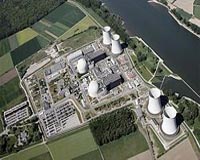 |
Riyadh, Saudi Arabia (UPI) Jul 14, 2010 Saudi Arabia's decision last week to sign a nuclear cooperation pact with France marks a major step forward for a pan-Arab drive toward nuclear power, even as the United States strives to rein in Iran's nuclear ambitions. Jordan is talking with Areva of France and Mitsubishi of Japan, among other companies, to acquire the technology required to build the Hashemite kingdom's first nuclear power generating plant. Earlier this month, the United Arab Emirates, which is the Arab state furthest down the path of developing nuclear energy, issued licenses to the Emirates Nuclear Energy Corp. to start preparing a site for a nuclear power facility. In December, the Emirates awarded a South Korean consortium a $20.4 billion contract to build and operate four 1,400-megawatt nuclear power plants. All told, 13 Middle Eastern states, including Egypt, have announced plans -- or dusted off old plans -- to build nuclear power stations since 2006. This is causing unease in Washington even though they have all declared that their objective is to boost electricity generation to meet a rapidly growing demand. "Oil producers are burning up reserves simply to keep pace with power demand that is growing by 7 to 8 percent every year in some (Persian) Gulf states," the Financial Times observed. All say they have no intention of seeking to develop nuclear weapons. But there is concern that once they've mastered the technology they'll seek to counter Iran's alleged push to acquire such weapons by doing so themselves. "The region looks around and they find all the non-Arabs have a nuclear program or are on their way," Mustafa Alani of the Gulf Research Center in Dubai told the Financial Times. "They look at India, Pakistan, Israel and now Iran." "There's a feeling this region made a mistake when they opted for zero nuclear energy for the last 40 years and the Iranian program was a wake-up call. The intention is civilian but you need the know-how at least." Lurking behind this rationale is a general, and seemingly growing, sense that U.S. President Barack Obama's administration is unable or unwilling to take on Iran over its contentious nuclear program. The Sunni-led Arab states, those in the gulf in particular, see Shiite-dominated Iran determined to become the regional colossus and without the conviction of U.S. protection, they feel extremely vulnerable and exposed. Saudi Arabia's King Abdallah, "fears that his country's historically closest ally is naive, and dangerously so, for putting so much faith in diplomacy," says British analyst Simon Henderson, an expert on Saudi Arabia with the Washington Institute for Near East Policy. "Despite the official blandishments, there are clear indications that under Abdallah, and especially since 2001, Saudi Arabia has put distance into its relationship with the United States "On Iran, there is a widening if not unbridgeable gap between the two countries," Henderson noted in a June 28 analysis. "The kingdom's own pursuit of (peaceful) nuclear energy is a clear sign that Riyadh thinks that the United States cannot or will not stop Iran's program." The Americans have sought to ensure that none of the Arab states will seek to enrich uranium to weapons-grade level. But in June, David Cox, assigned by Riyadh to evaluate the economic and technical feasibility of Saudi involvement in all stages of the nuclear cycle, was quoted as saying the Saudis would want to be involved in as many stages of the nuclear power cycle as possible. "Enrichment could happen there and the same with mining uranium," said Cox, president for energy at the British branch of Poyry, a Finnish management consultancy. "That mirrors the Iranian stance," Henderson noted, "though the ability to make low-enriched uranium for power plants is but for a few technical tweaks, the same technology needed to make highly enriched uranium for an atomic weapon." Washington will be uneasy with the Saudis opting for French nuclear assistance rather than American, which would have made surveillance of Saudi enrichment easier. The Obama administration endorsed the Emirates' contract with the South Koreans only after Abu Dhabi pledged to refrain from enriching uranium -- the process that's at the crux of the dispute with Tehran. But Washington is at odds with longtime ally Jordan because it plans to exploit large uranium deposits it recently discovered in the desert. The Americans see that as a proliferation risk.
Share This Article With Planet Earth
Related Links Nuclear Power News - Nuclear Science, Nuclear Technology Powering The World in the 21st Century at Energy-Daily.com
 Germany might sell reactor life years
Germany might sell reactor life yearsBerlin (UPI) Jul 13, 2010 The German government is considering auctioning off allowances to extend the lifespan of the country's nuclear reactors. Germany's Financial Times Deutschland newspaper Tuesday reported that Berlin is mulling such a plan, which observers say is aimed at filling the state coffers with much-needed cash. It would enable the country's utilities to bid at auctions for licenses to keep ... read more |
|
| The content herein, unless otherwise known to be public domain, are Copyright 1995-2010 - SpaceDaily. AFP and UPI Wire Stories are copyright Agence France-Presse and United Press International. ESA Portal Reports are copyright European Space Agency. All NASA sourced material is public domain. Additional copyrights may apply in whole or part to other bona fide parties. Advertising does not imply endorsement,agreement or approval of any opinions, statements or information provided by SpaceDaily on any Web page published or hosted by SpaceDaily. Privacy Statement |